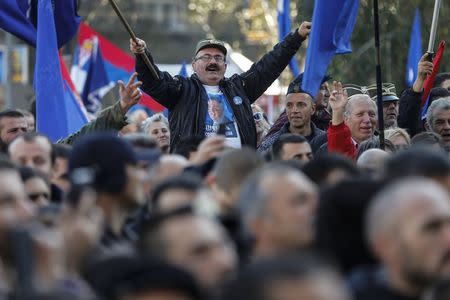Serb's release by UN court frees nationalist genie, Croat leader warns
ZAGREB (Reuters) - Croatia's president urged neighboring Serbia on Wednesday to "stop the escalation of nationalism and hatred" following the release of a hardline Serbian nationalist leader from a United Nations war crimes court. The Hague-based tribunal released Vojislav Seselj, who suffers from cancer, on grounds of ill health before it reached a verdict in his trial for atrocities in Croatia and Bosnia. He was released without conditions after 12 years in detention. Since his return to Serbia last Wednesday, Seselj has been hailed as a hero by a rally of 5,000 supporters and said he still believes in the 'Greater Serbia' ideology that fueled the wars in Bosnia, Croatia and Kosovo two decades ago. On Tuesday, he congratulated the "Serb liberators of Vukovar", further angering Croats on the anniversary of the eastern Croatian town's brutal capture in 1991 by the Yugoslav army and Serb rebels including Seselj's militia. "This is scandalous and terrible," Croatian president Ivo Josipovic said on Wednesday after a book promotion in Zagreb. "This is calling the genie of nationalism, aggression and atrocity back from the bottle." He said he expected Serbia, which has started talks to join the European Union, and its legal system "to prevent the escalation of nationalism and hatred". But Josipovic said he held the Hague tribunal responsible for departing from its previous practice, under which those provisionally released were strictly banned from making public appearances or political activity. "Unfortunately, for some reason the tribunal was too lenient, or it just failed to do what was necessary," he said. Croatia's Justice Minister Orsat Miljenic also criticized the decision to free Seselj. "This creature should be where he had been until recently, in jail," he said. "I am no medical expert but it seems to me that someone who is able to make such public appearances is surely able to wait for the end of his trial in custody." Miljenic said last week that Croatia would make trying all war crimes suspects a condition for progress in Serbia's EU accession talks although no further details have given. Leading his own defense, Seselj repeatedly obstructed his trial, and the verdict was delayed further when one of the judges was replaced. Seselj has said that if a verdict is ever reached, he will not return to the court voluntarily. (Reporting by Zoran Radosavljevic; Editing by Catherine Evans)



